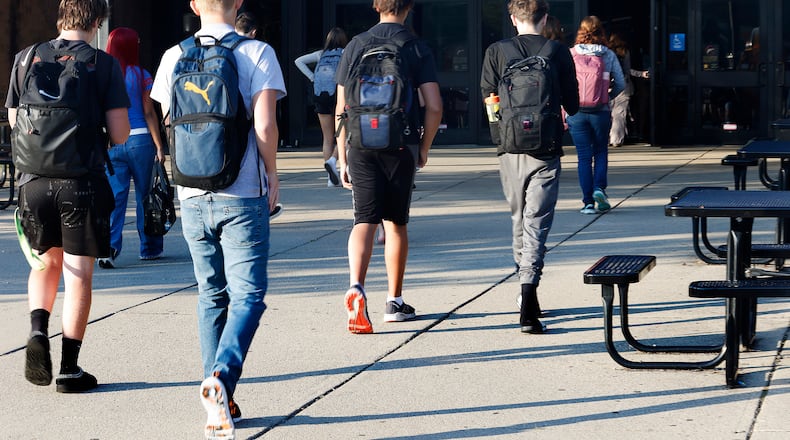Credit: CONTRIBUTED
Credit: CONTRIBUTED
Dayton Public Schools is taking a different approach while banning phones. It has used Yondr pouches, which lock cellphones into a pouch that can only be opened by a special magnet.
DPS is getting rid of those pouches in favor of an “envelope” system, in which officials collect phones at the beginning of the school day and hand them back at the end.
Districts have consistently said any students who has a documented need for their phones during school, such as monitoring blood sugar, should reach out to the school to work with the teachers.
Tighter policies
Centerville and Kettering both cite improving the “learning environment” as reasons for the move this school year.
“One important way that we can work together to ensure our students have the best possible access to learning is by addressing the distraction of cellphone use at school,” Kettering superintendent Mindy McCarty-Stewart said in a message to district families and staff.
A 2023 Pew Research Center survey found that about 72% of high school teachers said that students being distracted by cell phones is a major problem in their classrooms, compared with 33% of middle school teachers and 6% of elementary school teachers.
Beavercreek, Centerville and Kettering officials said repeat violators face progressive punishments. Enforcement and penalties differ for Centerville’s high school and middle school students, with the latter getting a grace period and lesser consequences for violations, according to the district.
High school offenders will have devices confiscated until the end of the day and have a conference with the principal. Penalties escalate for repeat offenders, with parents required to retrieve the devices after a third violation.
Offenders face in-school suspension and a requirement that their items must be stored in the unit office each day until further notice following a fourth offense.
“Our principals have said that the response from parents has been pretty positive overall,” Centerville schools spokeswoman Sarah Swan said.
In Beavercreek, violators would face similar confiscation policies and escalating punishments: a Saturday school assignment for an initial offense, two days of in-school suspension for the next and out-of-school suspensions after a third.
Beavercreek this year is using Yondr pouches, which neighboring Fairborn has been using for several years.
“In short, the decision was driven by four main motivations: to increase student safety in the building; to improve learning and instruction; to combat the negative social and emotional effects of cellphone use by teenagers; and to improve the school culture and climate,” said Beth Sizemore, a spokeswoman for Beavercreek schools.
Parent response
Beavercreek, Centerville and Kettering parents have concerns about the ability to reach their kids during school due to tighter policies and that students need their phones.
Schools have responded by asking parents to call the office to contact their kids and students to use the office phone to call a parent.
Some teachers say parents texting their kids is a distraction to their learning. In a presentation on the Beavercreek website, two safety officers at Beavercreek schools say preventing kids from accessing their phones in an emergency would help the first responders.
Beavercreek safety officer Chris Williams said confiscating cellphones will cut down on misinformation and rumors during an emergency and help staff keep students in place if the school needs to evacuate.
“First, the cellular network congestion created by several hundred students trying to call their families or families trying to call them is a real problem when staff and officers need to make phone calls and texts to relay important information and now can’t get through,” Williams said.
Dayton gets rid of Yondr
Dayton Public Schools was among the first in the region to adapt Yondr pouches, but the district isn’t using them starting this school year, said David Lawrence, DPS superintendent.
“We found a more efficient and inexpensive way,” Lawrence said.
Instead, the district plans to take student cellphones in the middle and high schools at the start of the day, put them in envelopes and give them back 10 minutes before the end of school. Some DPS buildings started this last school year.
DPS began using the cellphone pouches post-pandemic to minimize classroom distractions. But they aren’t cheap, and Lawrence said pouches were getting destroyed by students who wanted their phones back.
Lawrence said he’s heard very little pushback from families about cellphones.
“In fact, we’ve heard from parents, this is a good thing,” he said. “They need to take a break from their phone.”
Status quo
Springboro’s personal device policy, last updated in 2017, prohibits students from using them during school hours unless approved “by a teacher or administrator,” district records show.
School officials have shared a state model policy with parents and noted that “further communication will be forthcoming” to “keep our community updated on this throughout the school year,” district spokesman Scott Marshall said.
Likewise, Oakwood is not changing its policy this year.
“We are seeing some districts make moves to ban phones now,” Oakwood spokeswoman Amanda Brown said. “We will monitor their implementation and learn from their insights and implementation steps.”
Students in the region told the Dayton Daily News said policies at their schools were not consistently enforced last year. Area teachers say it is exhausting to constantly police who has a phone out.
Oakwood High School’s system includes placing students’ phones in a rack at the start of class.
“Two of my teachers enforce that,” said incoming sophomore Will Ross. “But the rest of my teachers just let us have it in class.”




